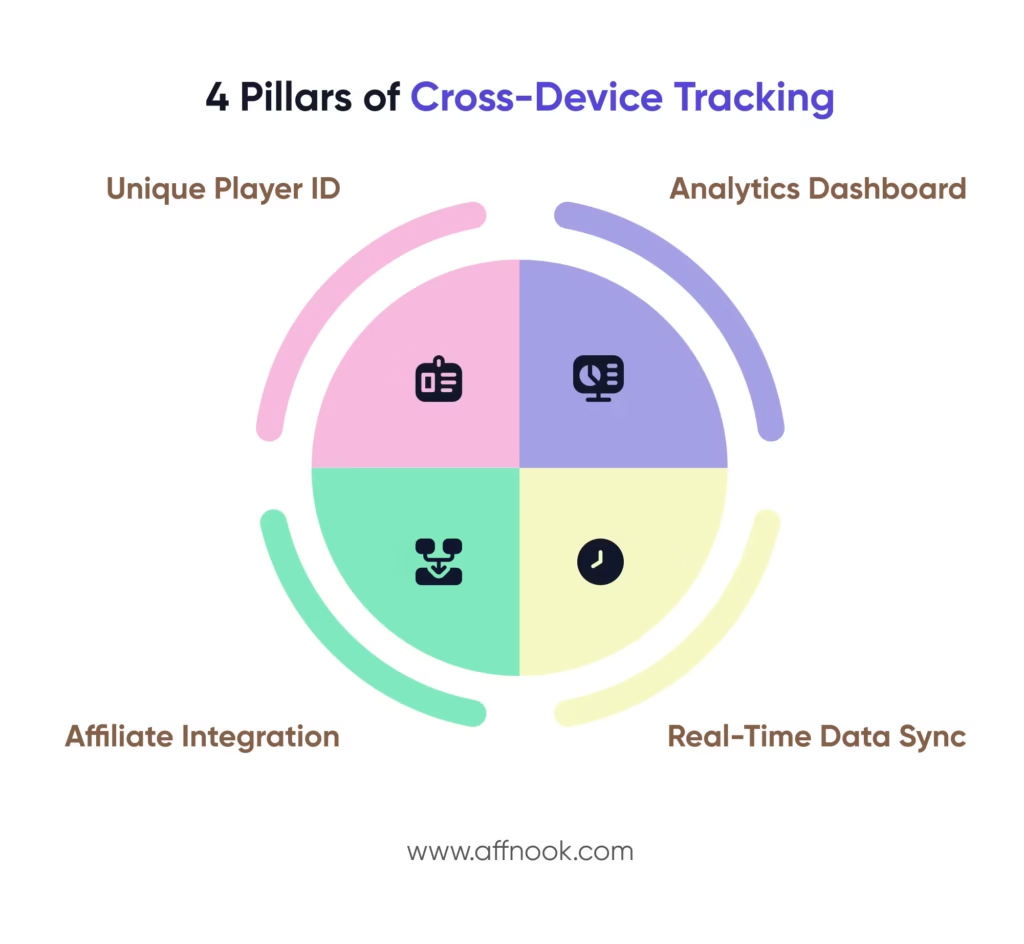Most iGaming operators are hemorrhaging potential revenue, not due to poor campaigns, but due to their tracking ceasing at the point when the device switch occurs. Traditional tracking stops tracking the player when they leap out of the phone to a laptop or desktop to a mobile app.
That is what we solve with cross-device tracking, the invisible glue that binds the interactions between players across devices and sessions. With players flowing freely in an industry that is mobile, desktop, and apps, it is this type of technology that keeps your data accurate, your partnerships fair, and your marketing spend efficient.
To brands and operators in iGaming, cross-device tracking is not only a nice-to-have, but the key to growth and not guesswork.
What Is Cross-Device Tracking in iGaming?
Simply, cross-device tracking can be defined as the procedure of recognizing and linking the activities of users across two or more devices. In simpler terms, it will inform you when the same user who watched an advertisement on their phone subsequently registers and deposits on a computer or app.
Conventional tracking solutions, such as cookies, can only track one device at a time. However, the current iGaming players are device-fluid; they alternate screens during the day. Cross-device tracking is bridging this gap, connecting all actions under a single player identity.
Example Scenario
Let’s say:
- An affiliate ad is clicked on by a player on mobile.
- A few hours later, they are registered on the desktop.
- The following day, they deposit into your app.
In the absence of cross-device tracking, these can be seen as three independent activities. They keep it together, and you, as well as the affiliate, can see the actual picture of the customer journey.
Why Cross-Device Tracking Matters in iGaming
The iGaming ecosystem is also built upon accuracy, in information, in performance, and in payouts. Lack of proper tracking not only makes the brands and affiliates invisible but also can have a direct impact on ROI and trust.
1. Accurate Attribution for Affiliates
Cross-device tracking will allow affiliates to be given incentives appropriately, even when a player switches devices halfway through a journey. It lowers conversion variances and creates trust in affiliate networks, boosting long-term relationships.
2. Smarter Player Insights for Operators
Operators can understand how the players actually behave, i.e., the devices they use to browse, register, and deposit. This assists in refining the marketing plans, enhancing user experience, and making wise decisions in ad budgets.
3. Higher ROI and Retention
Knowing touchpoints that drive conversions will also reduce wasted spend. You are able to spend more on high-performing channels and build retention campaigns that will reach players on the platforms they use the most.
How Cross-Device Tracking Works
1. Deterministic Tracking
It is a method that identifies users based on the identifiable details, i.e., the login details, email address, or account ID, and compares them across devices. It is also very precise since it is founded on proven data, but it needs user permission.
2. Probabilistic Tracking
Probabilistic tracking comes in when there is no deterministic data available. It relates the devices using digital fingerprint (such as IP address, device type, or time zone) and algorithms to provide an educated match.
Although it is less accurate, it is scalable and has powerful insights even in compliant environments.
3. Hybrid Tracking Models
The majority of developed iGaming platforms implement a combination of deterministic and probabilistic approaches. This hybrid model will not make you skip a player journey, even when some identifiers are not available.
Key Components of an Effective Cross-Device Tracking System
To make the most out of the cross-device data, the system of an operator should include the following elements that should be cooperative:
1. Unique Player ID (UPID)
Every player will have a unique identifier that links their activity across devices, which can be reported cleanly and accurately.
2. Advanced Analytics Dashboard
Operators and affiliates require centralized dashboards that visualize the entire journey of the player—click to conversion.
3. Real-Time Data Sync
Real-time data also means that deposits, sign-ups, and the in-game action are all visible instantly, allowing rapid decision-making.
4. Affiliate Integration
The tracking of devices should be smoothly incorporated into affiliate systems in order to create transparency on commissions, performance, and payout cycles.

Benefits of Cross-Device Tracking for iGaming Brands and Operators
The benefits extend much further than attribution—it is about optimization of your whole ecosystem.
1. Fairer Commission Models
Using precise tracking, no affiliate will lose out on conversions because of device switching. This creates a more open and reliable affiliate network.
2. Enhanced Player Journey Mapping
Operators will be able to see all touchpoints, starting with the initial clicking to the ultimate deposit, and this forms a complete narrative of player interaction.
3. Better Marketing Optimization
By understanding which devices are motivating results, marketers can better plan their budgets to increase ROI and decrease the cost of acquisition.
4. Improved Retention Strategies
Re-engagement campaigns can be intelligently targeted with consolidated data about the user. Timing and relevance become your strongest assets, whether it is in the form of email, push notifications, or personalized offers.
Challenges and Limitations of Cross-Device Tracking
There is no mighty weapon without difficulties—and cross-device tracking is not an exception.
1. Privacy Regulations (GDPR, CCPA)
Laws on data protection mandate explicit permission for tracking. iGaming operators should develop clear consent management software and anonymize sensitive information.
2. Walled Gardens and Data Fragmentation
Engines such as Apple and Google tend to restrict data sharing, which may hinder access to player journeys. To remain accurate, operators must diversify their sources of tracking.
3. Integration Complexity
It may be technically challenging to synchronize various devices, platforms, and affiliate systems. To have a smooth setup, it is essential to select the appropriate technology partner.
Best Practices for Implementing Cross-Device Tracking in iGaming
To brands and operators who would want to maximize efficiency, the following practices provide a solid ground:
1. Use a Hybrid Tracking Model
Both deterministic accuracy and probabilistic reach are combined to create a balance between accuracy and scale.
2. Maintain Full Compliance
Implement privacy-first consent features to adhere to GDPR and other data laws.
3. Regularly Audit Affiliate Data
Compare your affiliate reports with internal tracking systems to prevent discrepancies and ensure trust.
4. Choose the Right Platform
Choose software that provides cross-device analytics, transparent attribution, and real-time data visualization.
Such solutions as Affnook give precisely that, a strong infrastructure assisting iGaming operators and affiliate teams to consolidate data on players, monitor their performance across multiple devices, and optimize campaigns with a single dashboard.
The Future of Cross-Device Tracking in iGaming
The future suggests the smarter, privacy-aware, AI-based tracking systems.
AI will enhance player identification models and anticipate the user’s intention, and provide better personalisation. Even blockchain might be able to redefine transparency to provide secure audit trails of each tracked interaction.
And as cookies are gradually replaced, data on the first party and contextual knowledge will take over the next phase of truthful, ethical tracking.
Conclusion
Cross-device tracking has become a technical capability and strategic requirement for iGaming brands, operators, and affiliates. It makes the difference between disjointed information and holistic knowledge of the player, in a multi-device world, making fragmented clicks into a coherent progress narrative.
To operators who are willing to enter the future of precision-driven marketing and partnership transparency, investing in a sophisticated, compliance-based tracking system, such as Affnook, is not only prudent but necessary to remain on the leading edge.
Help Section
1. What is cross-device tracking in iGaming and why does it matter for operators?
Cross-device tracking links a player’s activity across mobile, desktop & app to form a unified profile. It matters because it ensures accurate attribution, prevents conversion loss, and empowers marketers to optimize campaigns and payouts.
2. How do deterministic vs probabilistic cross-device tracking methods differ in iGaming?
Deterministic tracking uses explicit identifiers (e.g. login, email) for precise matches. Probabilistic uses inferred signals (IP, behavior patterns) for matches when identifiers are absent. Many iGaming platforms use a hybrid model to maximize accuracy and scale.
3. How does cross-device tracking improve affiliate attribution in regulated gambling markets?
It ensures that when a player switches devices (e.g. mobile → desktop → app), affiliates still receive correct credit. This accuracy fosters trust, reduces disputes, and aligns payouts with true user journeys.
4. What are the common technical challenges implementing cross-device tracking in iGaming?
Challenges include consent and privacy laws (GDPR/CCPA), fragmented identifiers across devices, browser cookie restrictions, and integrating multiple platforms reliably. Operators must manage both tracking infrastructure and regulatory compliance.
5. What best practices should iGaming operators follow when deploying cross-device tracking?
Operators should adopt a consent-first hybrid model (deterministic + probabilistic), audit affiliate data, ensure cross-browser compatibility, use real-time syncing, and choose platforms offering transparent dashboards and privacy compliance.




